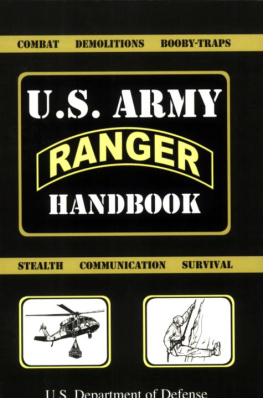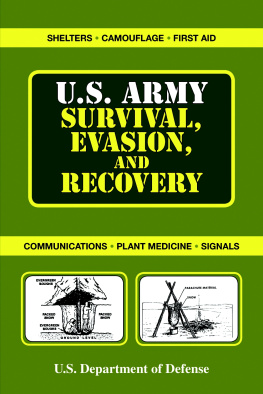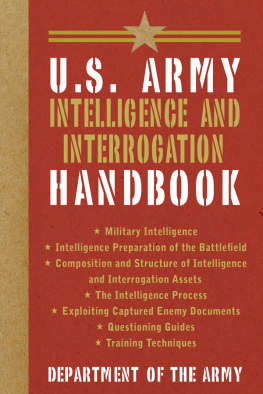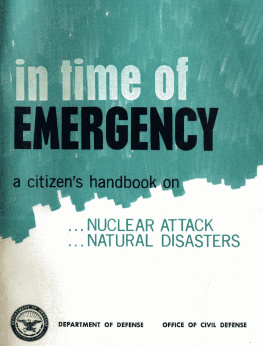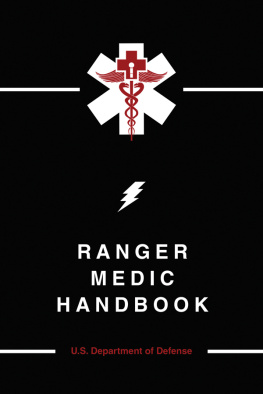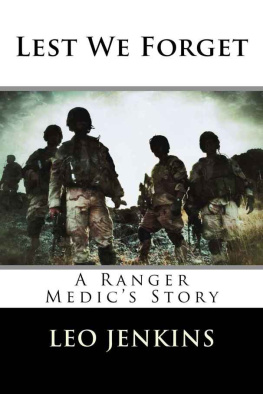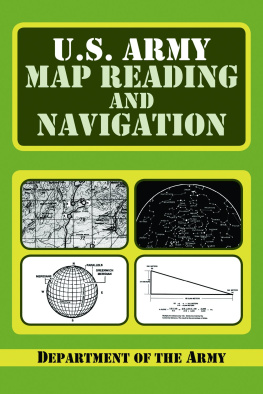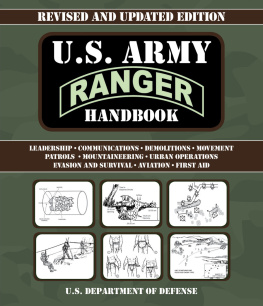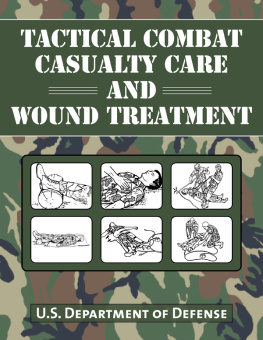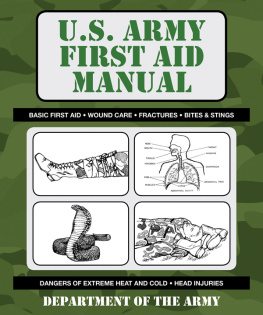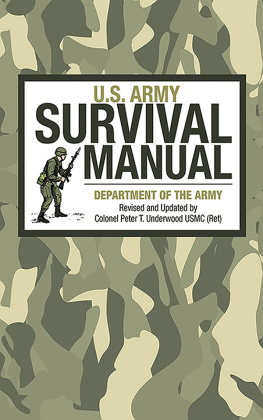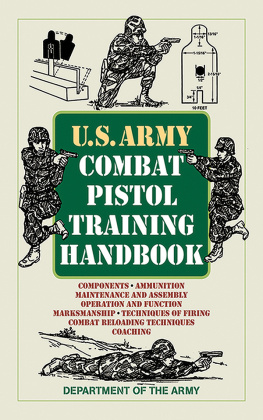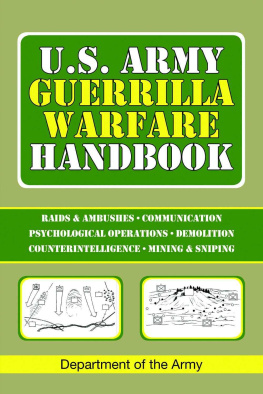U.S. Department of Defense - U.S. Army Ranger Handbook
Here you can read online U.S. Department of Defense - U.S. Army Ranger Handbook full text of the book (entire story) in english for free. Download pdf and epub, get meaning, cover and reviews about this ebook. year: 2008, genre: Romance novel. Description of the work, (preface) as well as reviews are available. Best literature library LitArk.com created for fans of good reading and offers a wide selection of genres:
Romance novel
Science fiction
Adventure
Detective
Science
History
Home and family
Prose
Art
Politics
Computer
Non-fiction
Religion
Business
Children
Humor
Choose a favorite category and find really read worthwhile books. Enjoy immersion in the world of imagination, feel the emotions of the characters or learn something new for yourself, make an fascinating discovery.
- Book:U.S. Army Ranger Handbook
- Author:
- Genre:
- Year:2008
- Rating:4 / 5
- Favourites:Add to favourites
- Your mark:
- 80
- 1
- 2
- 3
- 4
- 5
U.S. Army Ranger Handbook: summary, description and annotation
We offer to read an annotation, description, summary or preface (depends on what the author of the book "U.S. Army Ranger Handbook" wrote himself). If you haven't found the necessary information about the book — write in the comments, we will try to find it.
U.S. Army Ranger Handbook — read online for free the complete book (whole text) full work
Below is the text of the book, divided by pages. System saving the place of the last page read, allows you to conveniently read the book "U.S. Army Ranger Handbook" online for free, without having to search again every time where you left off. Put a bookmark, and you can go to the page where you finished reading at any time.
Font size:
Interval:
Bookmark:

U.S. Army Ranger Handbook
U.S. Army Ranger Handbook
U.S. Department of Defense


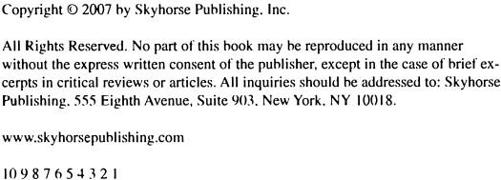

PREFACE
THIS PUBLICATION IS BOTH AN EXTRACT OF DOCTRINAL PUBLICATIONS AND A COMPIlAT1ON OF TACTICS. TECHNIQUES AND PROCEDURES TAUGHT IN THE U.S. ARMY RANGER SCHOOL _ fT IS PRINCIPALLY DESIGNED AS A POCKET REFERENCE FOR STUDENTS OF THE U S ARMY RANGER SCHOOL ff s SECONDARY USE IS FOR THE DEVELOPMENT OI SMAL J UNIT LEADERS IN THE FTEI!) AS A POCKET GUIDE.
Till TECHNIQUES 11S1TI) HEREON WILL BE TAUGHT AT 111L U S ARMY RANGER SCHOOL STUDENT GRADES ARE BASED ON THEIR EMPLOYMENT OF SOUND. DOCTRINAL PRINCIPALS. NOT ON THE FMPI.OYMI:NT OF A SPECIFIC TECHNIQUE.
TABLE OF CONTENTS
CHAPTER 1 - LEADERSHIP
............................................................ 1
CHAPTER 2 - OPERATIONS
CHAPTER 3 - FIRE SUPPORT
CHAPTER 4 - MOVEMENT
CHAPTER 5 - PATROLLING
......................................................................... 89
CHAPTER 6 - BATTLE DRILLS
CHAPTER 7 - COMMUNICATIONS
CHAPTER 8 - ARMY AVIATION
CHAPTER 9 - WATERBORNE OPERATIONS
CHAPTER 10 - MILTARY MOUNTAINEERING
CHAPTER 11 - EVASION/SURVIVAL
CHAPTER 12 - FIRST AID
CHAPTER 13 - DEMOLITIONS
CHAPTER 14 - RANGER URBAN OPERATIONS
RANGER CREED
Recognizing that I volunteered as a Ranger, fully knowing the hazards of my chosen profession, I will always endeavor to uphold the prestige, honor, and high esprit de corps of the Rangers.
Acknowledging the fact that a Ranger is a more elite soldier who arrives at the cutting edge of battle by land, sea, or air, I accept the fact that as a Ranger my country expects me to move further, faster, and fight harder than any other soldier.
Never shall I fail my comrades I will always keep myself mentally alert, physically strong, and morally straight and I will shoulder more than my share of the task whatever it may be, one hundred percent and then some.
Gallantly will I show the world that I am a specially selected and well trained soldier. My courtesy to superior officers, neatness of dress, and care of equipment shall set the example for others to follow.
Energetically will I meet the enemies of my country. I shall defeat them on the field of battle for I am better trained and will fight with all my might. Surrender is not a Ranger word. I will never leave a fallen comrade to fall into the hands of the enemy and under no circumstances will I ever embarrass my country.
Readily will I display the intestinal fortitude required to fight on to the Ranger objective and complete the mission, though I be the lone survivor.
STANDING ORDERS ROGERS RANGERS

........................................................................ 1. Don't forget nothing.
2. Have your musket clean as a whistle, hatchet scoured, sixty rounds powder and ball, and be ready to march at a minute's warning.
3. When you're on the march, act the way you would if you was sneaking up on a deer. See the enemy first.
4. Tell the truth about what you see and what you do. There is an army depending on us for correct information. You can lie all you please when you tell other folks about the Rangers, but don't never lie to a Ranger or officer.
5. Don't never take a chance you don't have to.
6. When we're on the march we march single file, far enough apart so one shot can't go through two men.
7. If we strike swamps, or soft ground, we spread out abreast, so it's hard to track us.
8. When we march, we keep moving till dark, so as to give the enemy the least possible chance at us.
9. When we camp, half the party stays awake while the other half sleeps.
10. If we take prisoners, we keep'em separate till we have had time to examine them, so they can't cook up a story between'em.
11. Don't ever march home the same way. Take a different route so you won't be ambushed.
12. No matter whether we travel in big parties or little ones, each party has to keep a scout 20 yards ahead, 20 yards on each flank, and 20 yards in the rear so the main body can't be surprised and wiped out.
13. Every night you'll be told where to meet if surrounded by a superior force.
14. Don't sit down to eat without posting sentries.
15. Don't sleep beyond dawn. Dawn's When the French and Indians attack.
16. Don't cross a river by a regular ford.
17. If somebody's trailing youZ make a circle, come back onto your own tracks, and ambush the folks that aim to ambush you.
18. Don't stand up when the enemy's coming against you. Kneel down, lie down, hide behind a tree.
19. Let the enemy come till he's almost close enough to touch, then let him have it andjump out and finish him up with your hatchet.
MAJOR ROBERT ROGERS 1759

RANGER HISTORY
The history of the American Ranger is a long and colorful saga of courage, daring and outstanding leadership. It is a story of men whose skills in the art of fighting have seldom been surpassed. Only the highlights of their numerous exploits are told here.
Rangers primarily performed defensive missions until Benjamin Church's Company of Independent Rangers from Plymouth Colony proved successful in raiding hostile Indians during King Phillip's War in 1675. In 1756 Major Robert Rogers, a native of New Hampshire, recruited nine companies of American colonists to fight for the British during the French and Indian War. Ranger techniques and methods of operation were an inherent characteristic of the American frontiersmen; however, Major Rogers was the first to capitalize on them and incorporate them into the fighting doctrine of a permanently organized fighting force.
The method of fighting used by the first Rangers was further developed during the Revolutionary War by Colonel Daniel Morgan, who organized a unit known as "Morgan's Riflemen". According to General Burgoyne, Morgan's men were "....the most famous corps of the Continental Army, all of them crack shots."
Francis Marion, the "Swamp Fox", organized another famous Revolutionary War Ranger element known as "Marion's Partisans". Marion's Partisans, numbering anywhere from a handful to several hundred, operated both with and independent of other elements of General Washington's Army. Operating out of the Carolina swamps, they disrupted British communications and prevented the organization of loyalists to support the British cause, substantially contributing to the American victory.
The American Civil War was again the occasion for the creation of special units such as Rangers. John S. Mosby, a master of the prompt and skillful use of cavalry, was one of the most outstanding Confederate Rangers.He believed that by resorting to aggressive action he could compel his enemies to guard a hundred points. He would then attack one of the weakest points and be assured numerical superiority.
Next pageFont size:
Interval:
Bookmark:
Similar books «U.S. Army Ranger Handbook»
Look at similar books to U.S. Army Ranger Handbook. We have selected literature similar in name and meaning in the hope of providing readers with more options to find new, interesting, not yet read works.
Discussion, reviews of the book U.S. Army Ranger Handbook and just readers' own opinions. Leave your comments, write what you think about the work, its meaning or the main characters. Specify what exactly you liked and what you didn't like, and why you think so.

